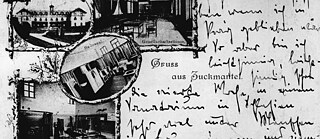Digitised diaries
The Kafka search engine

In a subsection of the University of Vienna website, all of Franz Kafka’s journals and letters are freely accessible and searchable. The person behind the website is Werner Haas, librarian at the University of Vienna. Digitising Kafka’s documents was a matter of a personal concern to him and a project close to his heart. An email exchange.
By Verena Hütter
At our very first Kafka meeting at the Goethe-Institut, when we – Franziska from Paris, Tomas from Prague, Johannes from Madrid, Mohit from Delhi and Marta, Jörn and I from Munich – met online to discuss our jointly planned Kafka project (this edition of ZEITGEISTER!), Tomas said: “I’m going to post a link for you in the chat. At the University of Vienna, Kafka’s journals and all of his letters have been digitised. You can search for content by entering words in the filter. It’s an amazing treasure trove!”
Tomas showed us what he meant. When it was Johannes’ birthday, Tomas searched the Kafka archive for “birthday” (30 matches) and congratulated Johannes in our Whatsapp group using Franz Kafka’s own words: “I’m not very well prepared for your birthday. I slept even worse than usual, my head is hot, my eyes are burning, my temples are throbbing, I’m coughing too. I don’t think I could utter a long wish without coughing. Fortunately, no wish is necessary, only thanks that you are here in this world.” This is what Franz Kafka wrote to the Czech writer Milena Jesenská on 10 August 1920.
Since this birthday message, we have searched the archives for all kinds of terms, “potato”, “sport”, "dog”, “leopard skin coat”, and made the most fascinating discoveries. We have the archives to thank for several of the articles in this edition of ZEITGEISTER. This was why I was so keen to track down the site operator and thank him. It was not difficult to find him. His name is part of the website URL: homepage.univie.ac.at/werner.haas. Werner Haas responded to my e-mail straight away and answered the following questions I had for him.
Werner Haas, since when have Franz Kafka’s letters and diaries been available online at the University of Vienna?
Since around October 2006. This website is a personal site so I took it with me when I changed jobs and moved to Vienna. Before that, you could access it through the University of Innsbruck.
Is this the only place where the letters and diaries are freely available and searchable using keywords?
That’s possible, at least I haven’t found any other websites like it.
Was digitising Kafka’s letters a matter of particular importance to you?
Originally, I just created a chronological list of all his letters and diary entries, because it was a bit laborious searching through the different collections of letters. This information then expanded gradually.
Do you particularly like Franz Kafka?
Yes.
What is your favourite Kafka book or short story?
That’s a question I find most difficult to answer. But I can say that I particularly like the short story Blumfeld, an Elderly Bachelor.
Are you from Vienna?
Yes.
Are you a librarian? How long have you been working at the University of Vienna?
Yes. Since 2006.
How many pages have been digitised in total? How long did it take?
The website consists of around 2,200 individual pages. I didn’t make a note of how long it took me. It’s not important ;-).
Was digitisation possible because copyrights have expired? (70 years after the death of the author?)
That’s correct; that’s the reason why this website exists. Otherwise, it would just be a collection of texts on my personal computer.
Do you receive much feedback? What do students/people use the pages for? Do you know which keywords are most popular?
No. Unfortunately, I can’t say what other people use the website for or what they’re looking for.
Many thanks, Werner Haas, for digitising the Kafka diaries and letters! The archive has been a valuable source of information for us for the production of this edition of ZEITGEISTER.